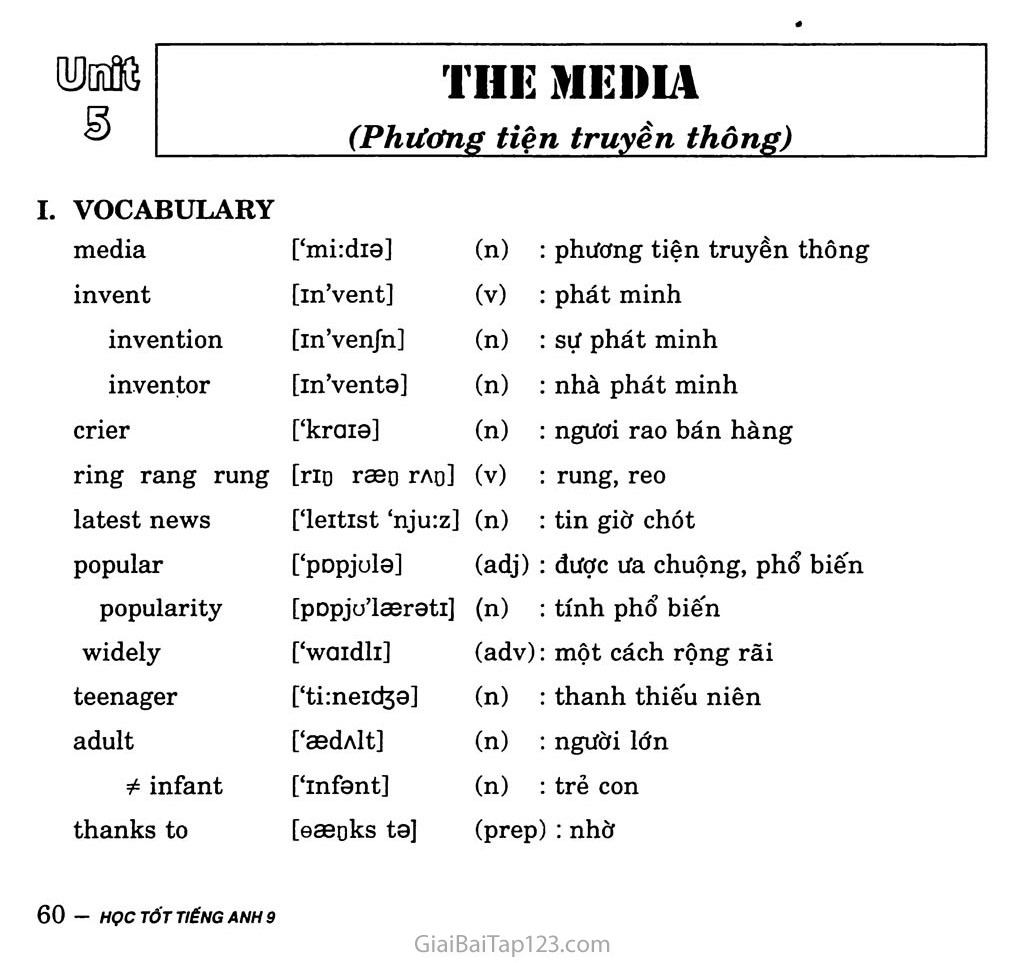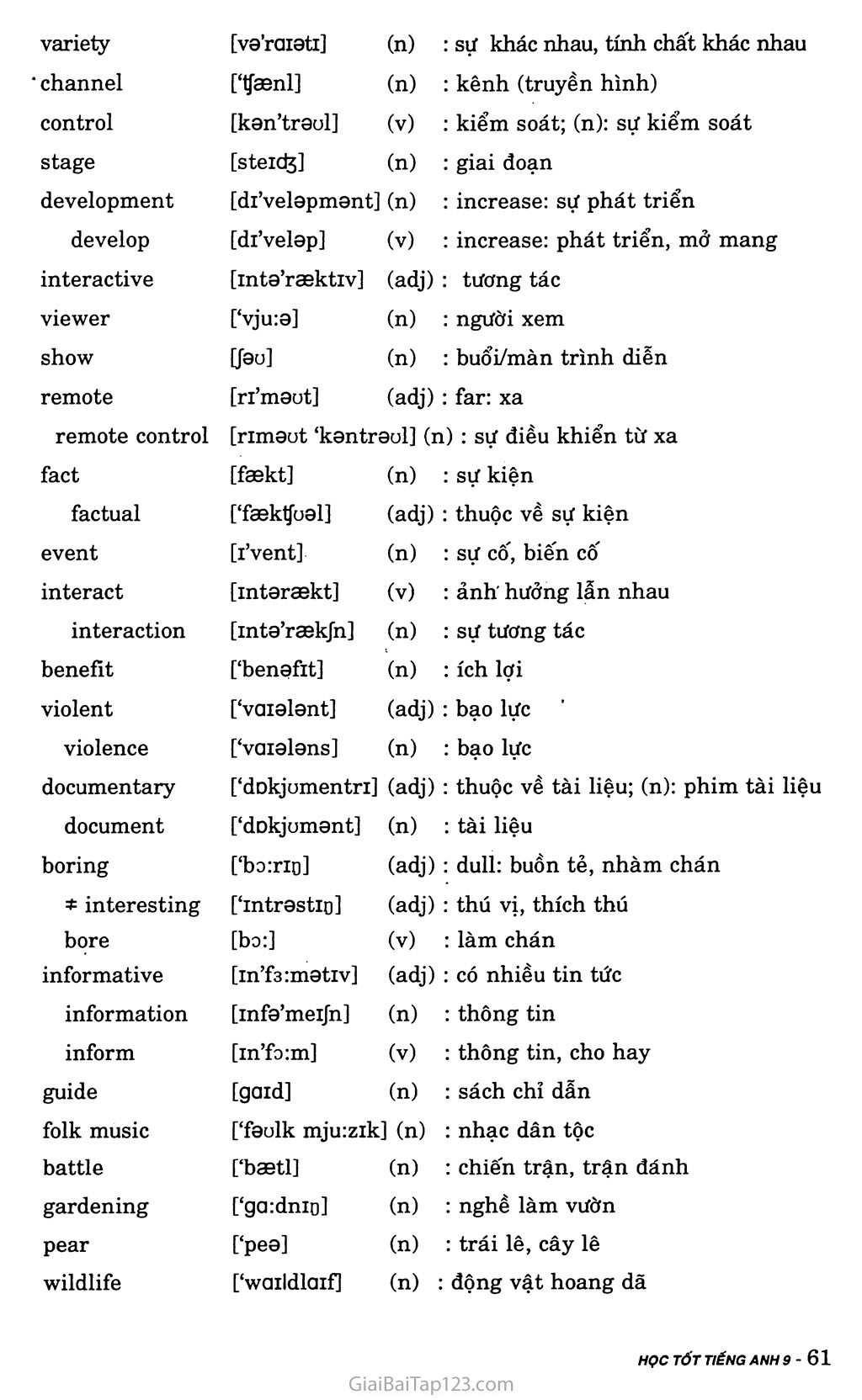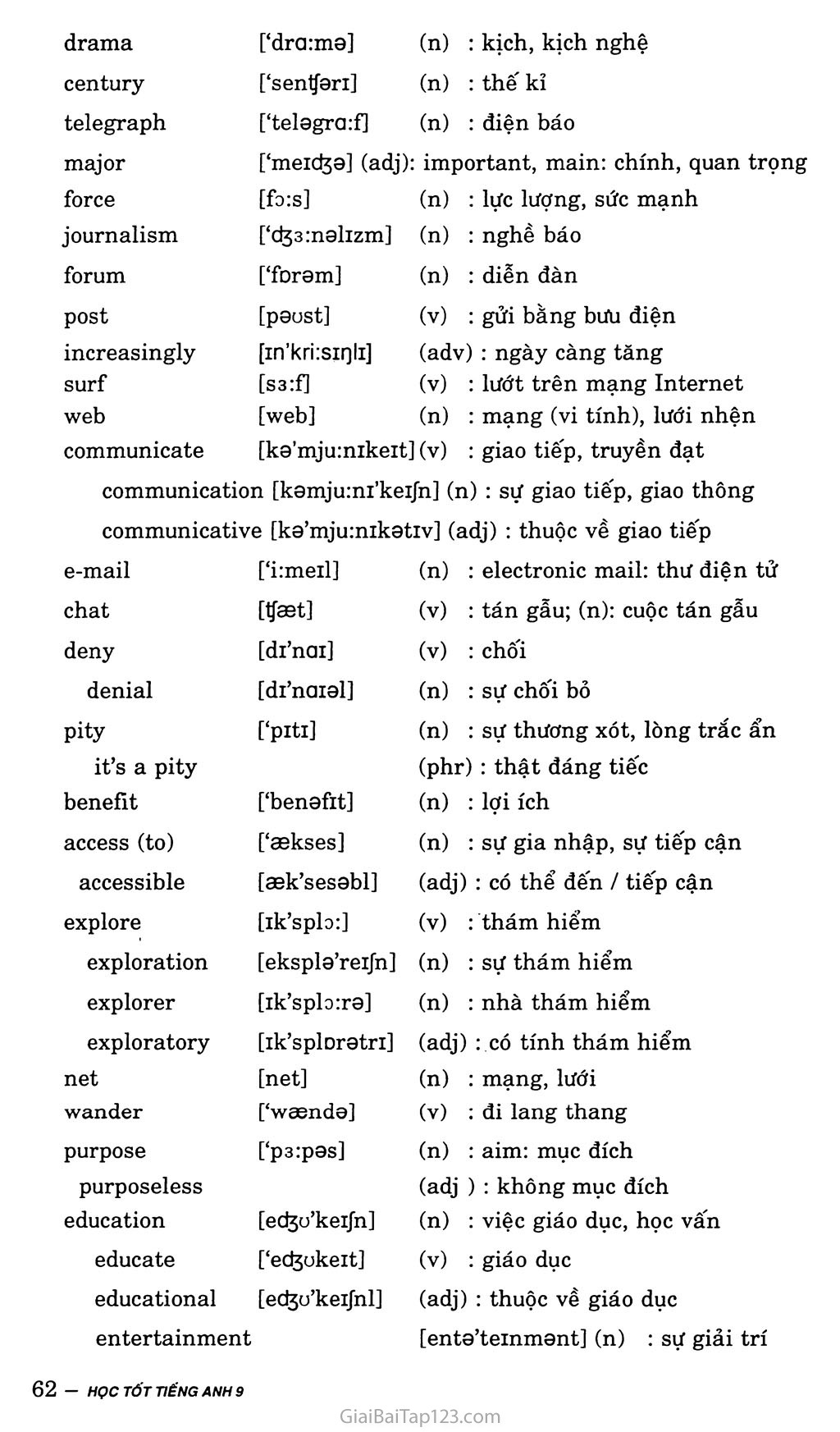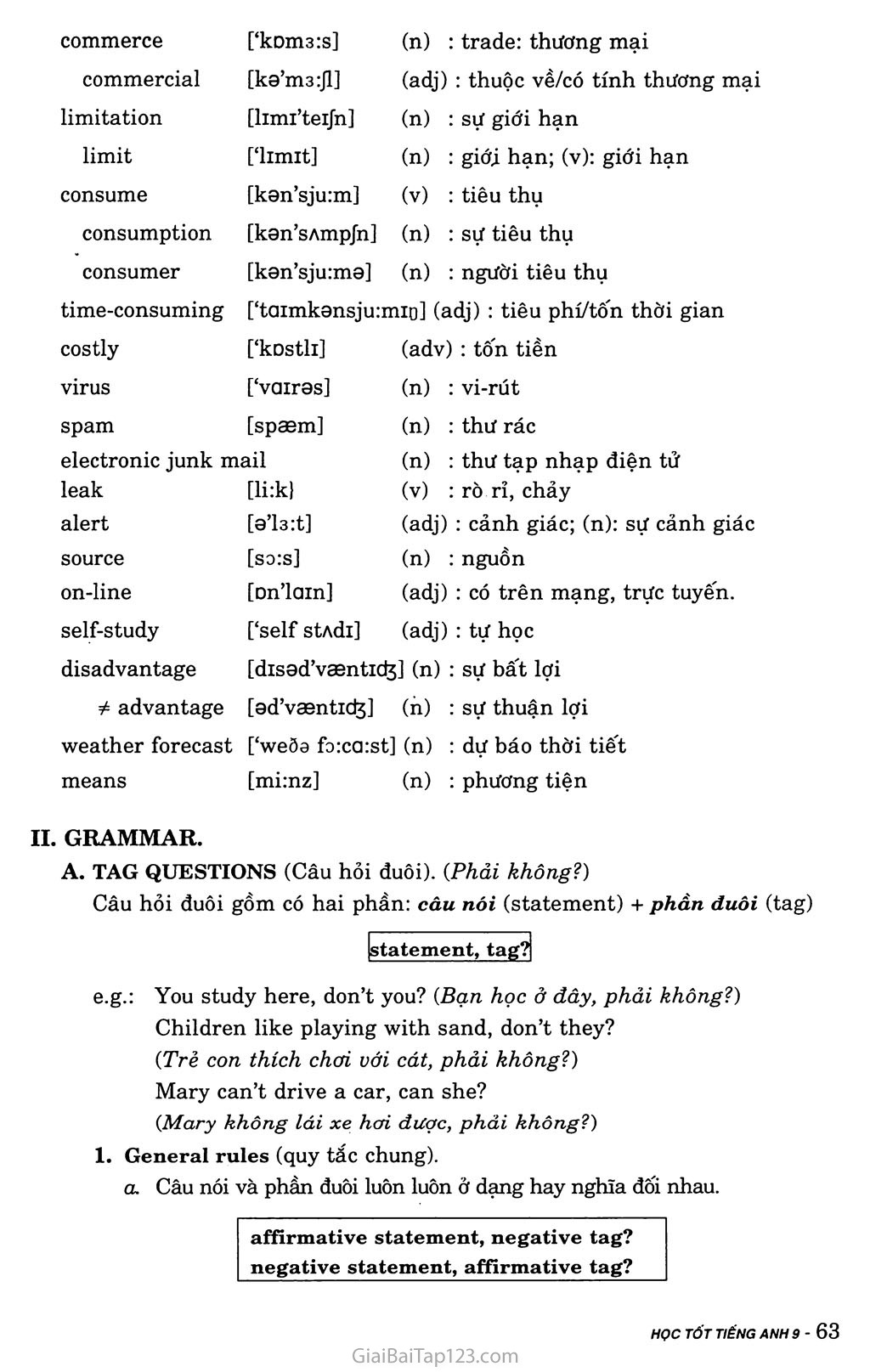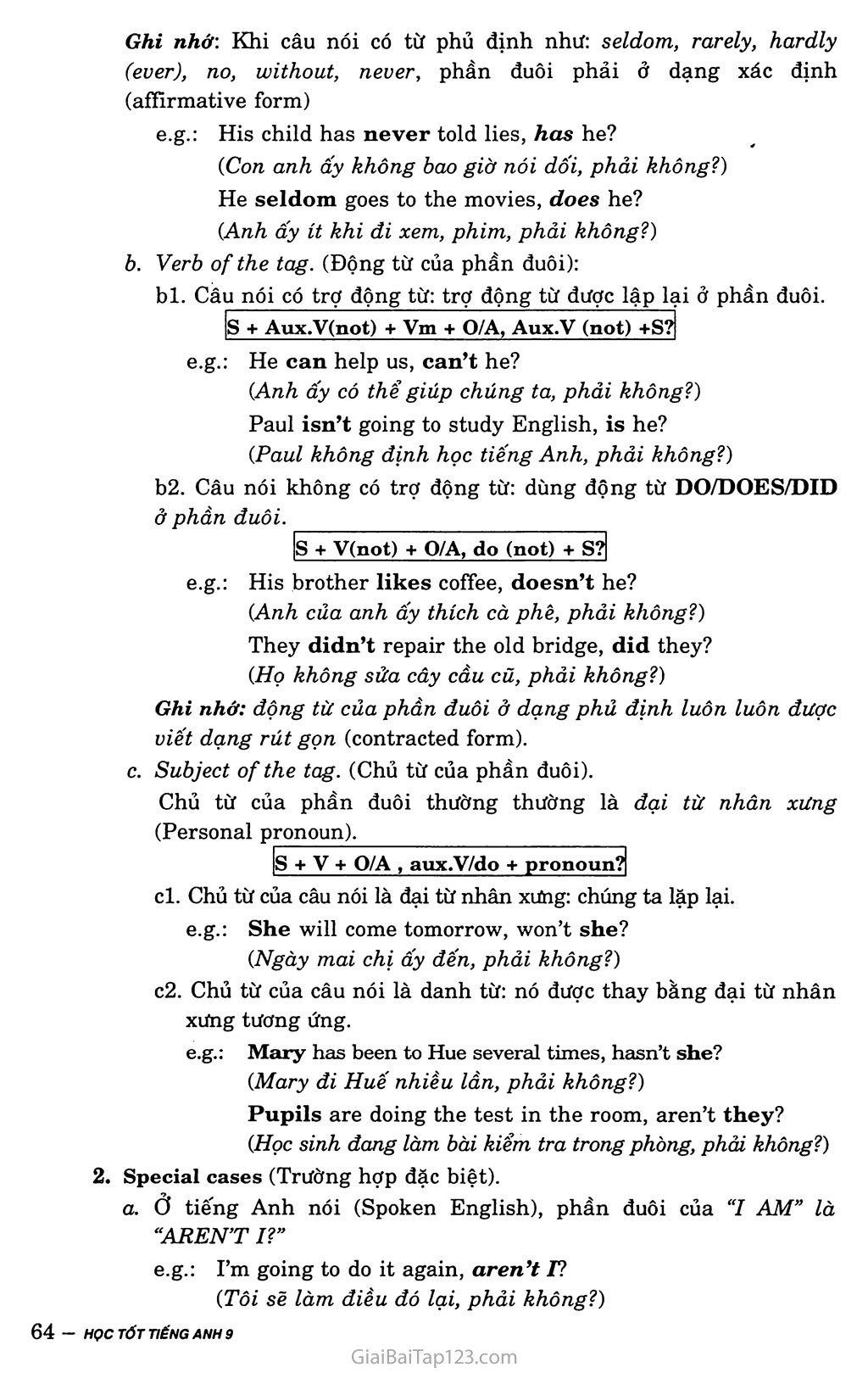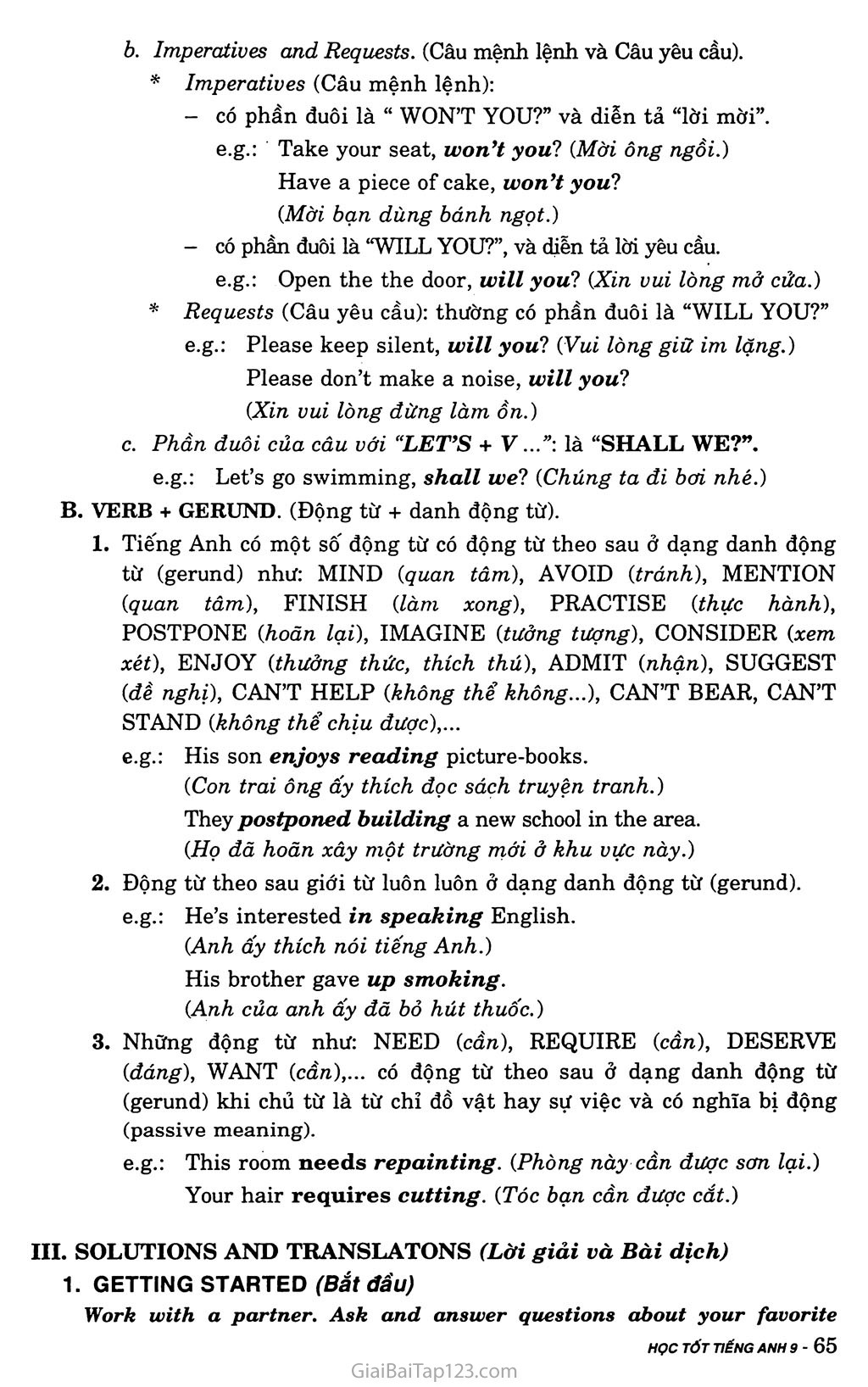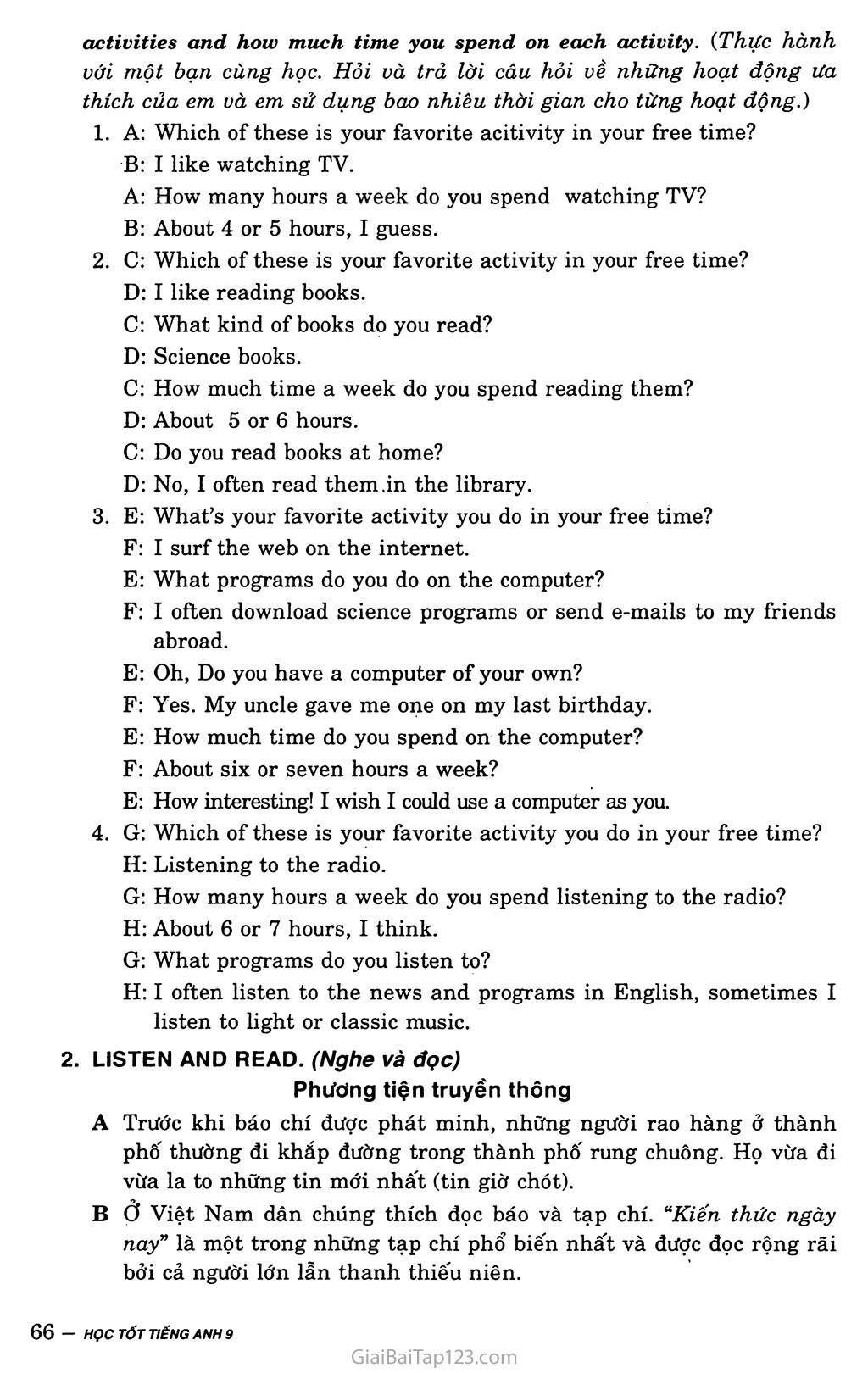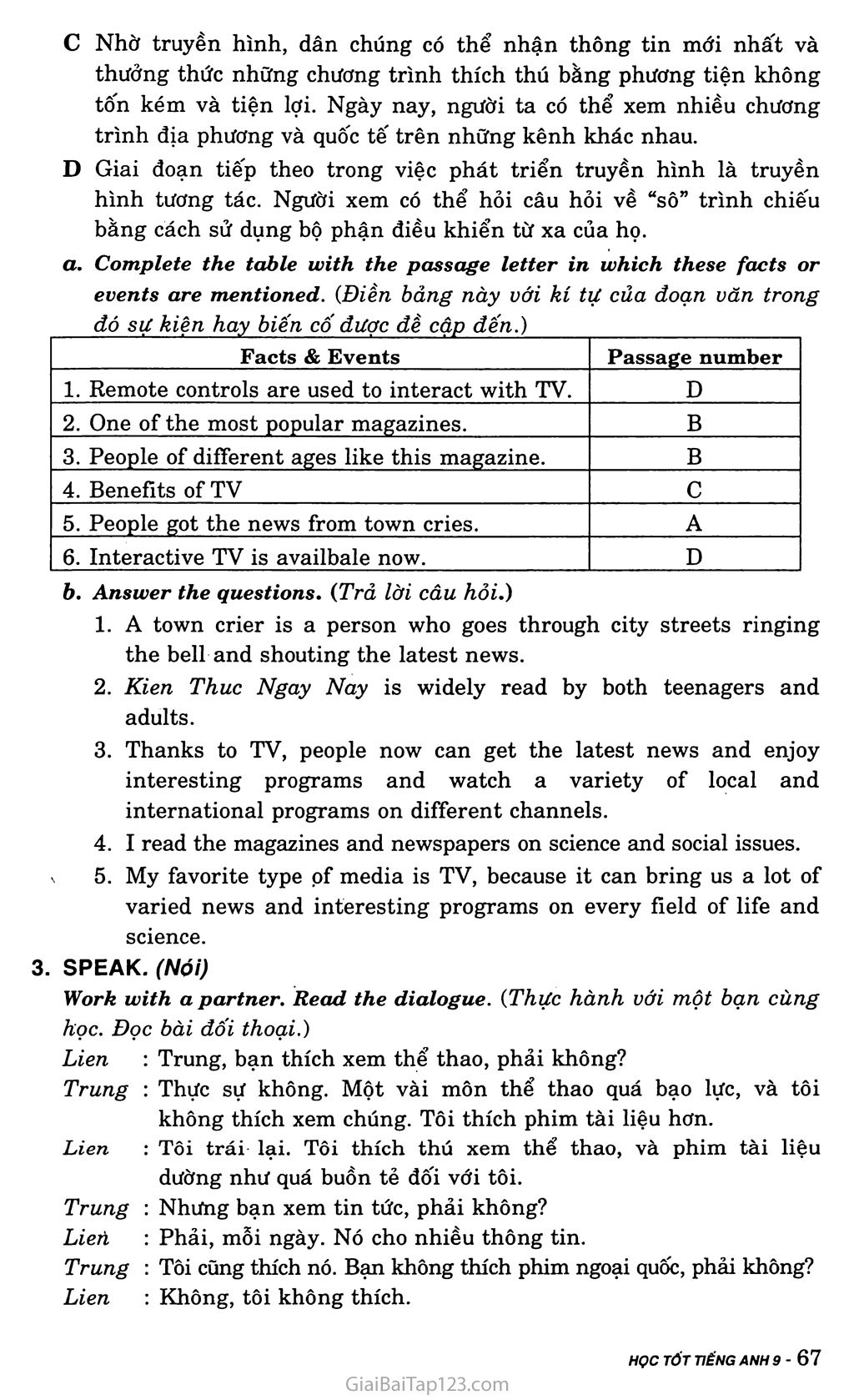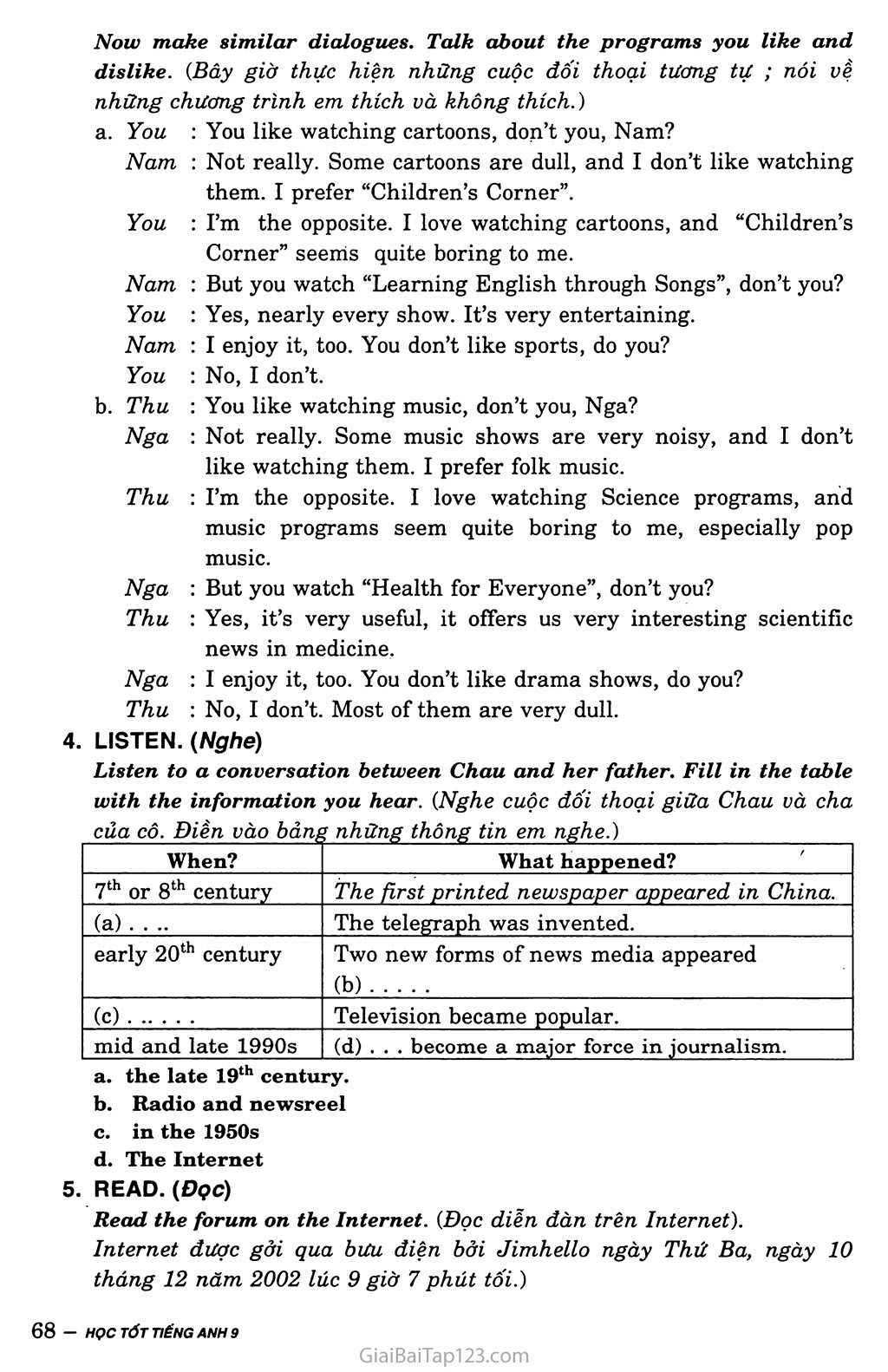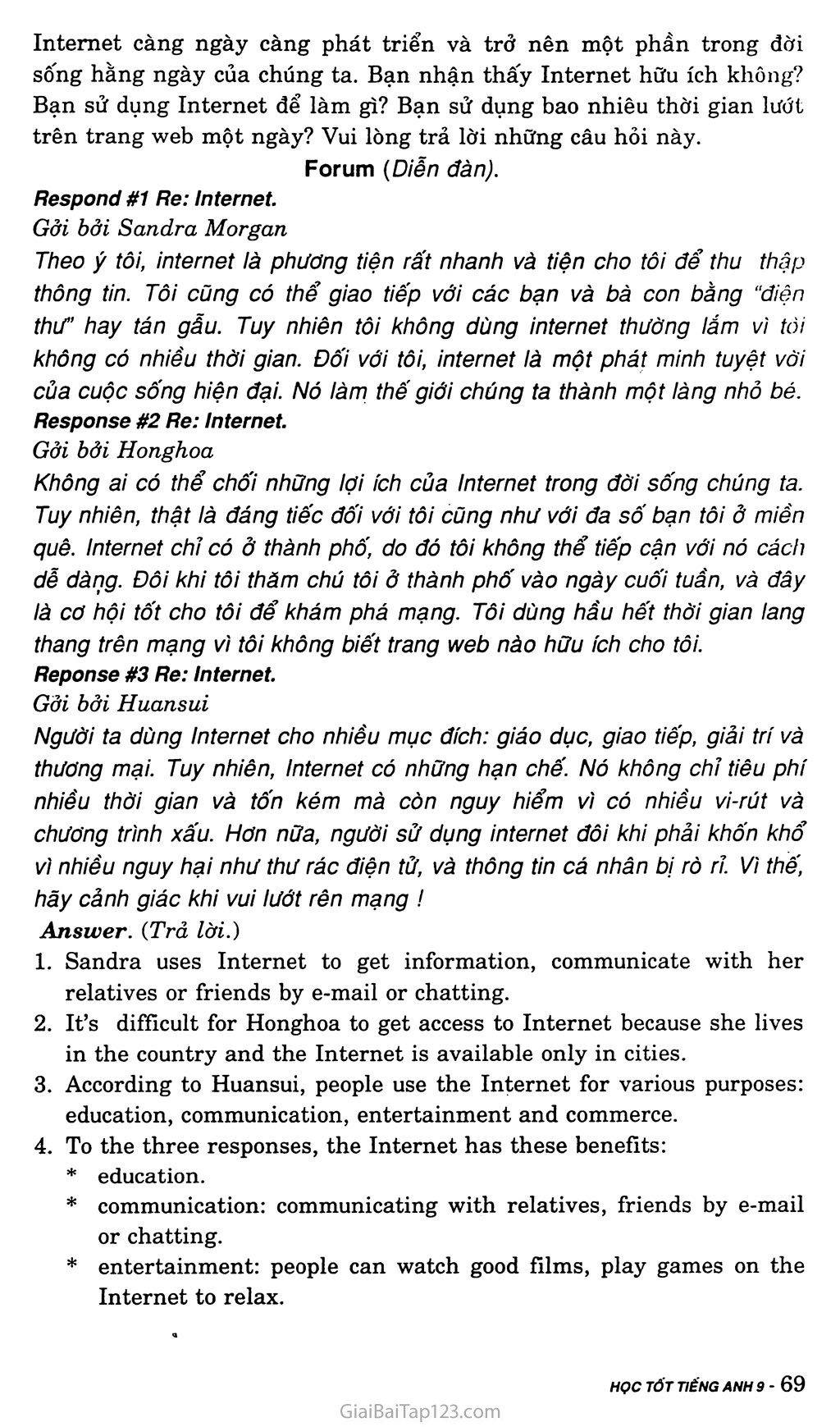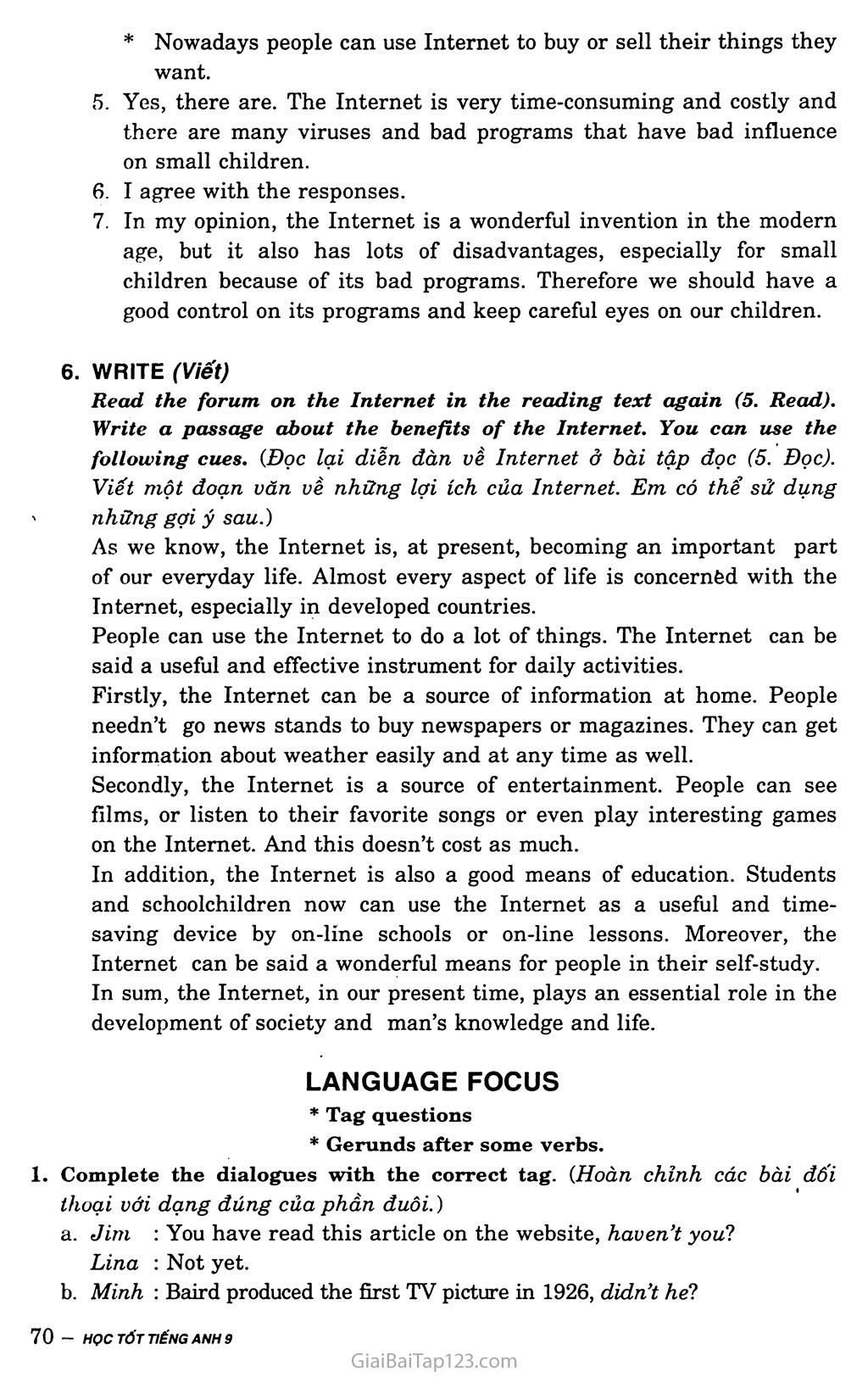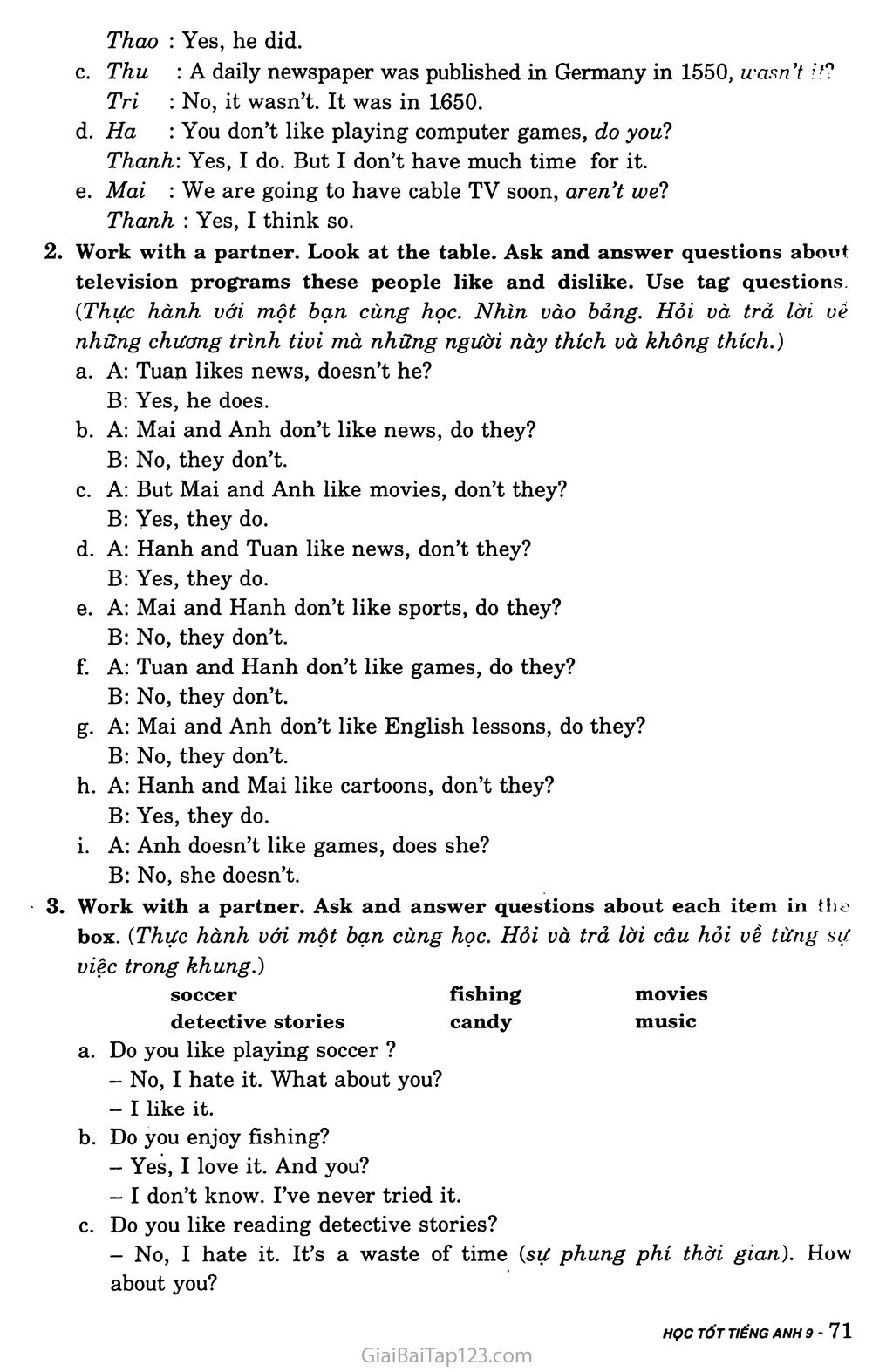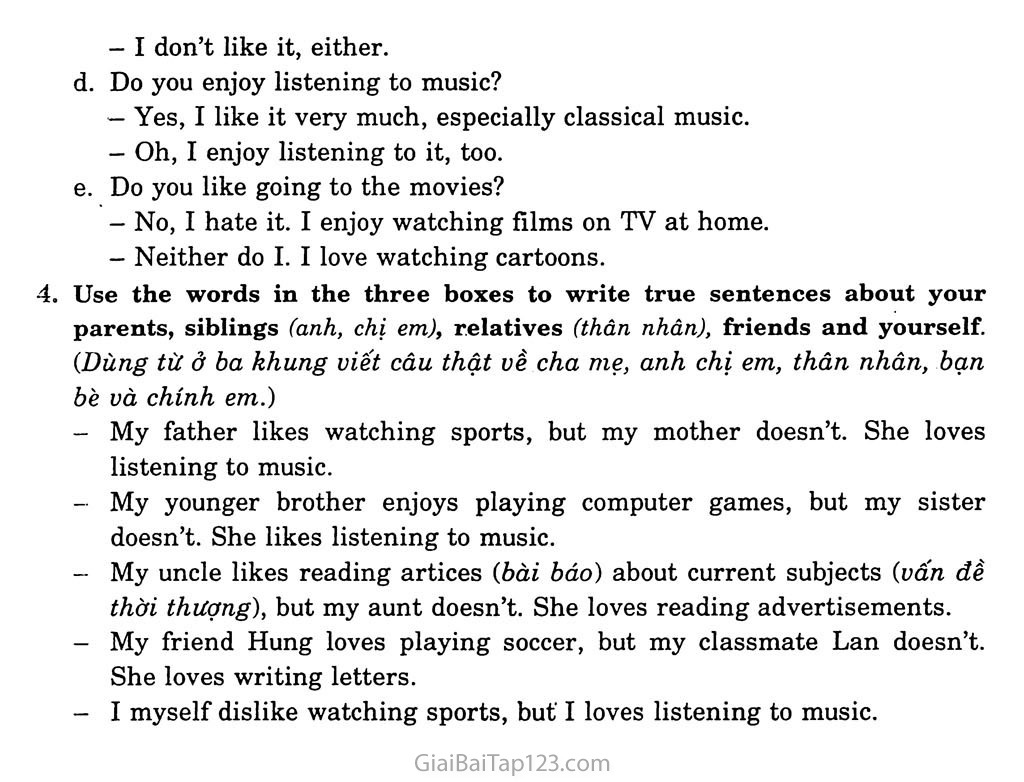Giải tiếng Anh lớp 9 Unit 5: The Media
THE MEDIA
(Phương tiện truyền thông)
I. VOCABULARY
media
[‘mi:dia]
(n) :
phương tiện truyền thông
invent
[in’vent]
(v) :
phát minh
invention
[in’venffi]
(n) :
sự phát minh
inventor
[in’venta]
(n) :
nhà phát minh
crier
[‘kraia]
(n) :
ngươi rao bán hàng
ring rang rung
[riũ raarj rArj]
(v) :
rung, reo
latest news
[‘leitist ‘nju:z]
(n) :
tin giờ chót
popular
[‘pDpjola]
(adj) :
được ưa chuộng, phổ biến
popularity
[pDpju’lasrati]
(n) :
tính phổ biến
widely
[‘waidli]
(adv):
một cách rộng rãi
teenager
[‘ti:neid3a]
(n) :
thanh thiếu niên
adult
[‘aadAlt]
(n) :
người lớn
/ infant
[‘infant]
(n) :
trẻ con
thanks to
[eseoks ta]
(prep)
: nhờ
variety
[va’raiati]
(n) : sự khác nhau, tính chất khác nhau
channel
[‘tfaenl]
(n) : kênh (truyền hình)
control
[kan’traol]
(v) : kiểm soát; (n): sự kiểm soát
stage
[steidj]
(n) : giai đoạn
development
[di’velapmant] (n) : increase: sự phát triển
develop
[di’velap]
(v) : increase: phát triển, mở mang
interactive
[inta’raektiv]
(adj) : tương tác
viewer
[‘vju:a]
(n) : người xem
show
[fan]
(n) : buổi/màn trình diễn
remote
[ri’maut]
(adj) : far: xa
remote control
[rimaot ‘kantraul] (n) : sự điều khiển từ xa
fact
[faekt]
(n) : sự kiện
factual
[‘faektfual]
(adj) : thuộc về sự kiện
event
[i’vent]
(n) : sự cố, biến cố
interact
[intaraekt]
(v) : ảnh hưởng lẫn nhau
interaction
[inta’raekjn]
(n) : sự tương tác
benefit
[‘benefit]
(n) : ích lợi
violent
[‘vcnalant]
(adj) : bạo lực
violence
[‘vaialans]
(n) : bạo lực
documentary
[‘dDkjomentri] (adj) : thuộc về tài liệu; (n): phim tài liệu
document
[‘dDkjumant]
(n) : tài liệu
boring
[‘bo:rio]
(adj) : dull: buồn tẻ, nhàm chán
* interesting
[‘intrastio]
(adj) : thú vị, thích thú
bore
[bo:]
(v) : làm chán
informative
[in’f3:mativ]
(adj) : có nhiều tin tức
information
[infa’meifn]
(n) : thông tin
inform
[in’fo:m]
(v) : thông tin, cho hay
guide
[gaid]
(n) : sách chỉ dẫn
folk music
[‘faulk mju:zik] (n) : nhạc dân tộc
battle
[‘bsetl]
(n) : chiến trận, trận đánh
gardening
[‘ga:dnirj]
(n) : nghề làm vườn
pear
[‘pea]
(n) : trái lê, cây lê
wildlife
[‘waildlaif]
(n) : động vật hoang dã
drama
century
telegraph
major
force
journalism
forum
post
increasingly
[‘dra:ma]
[‘sentfari]
[‘telagra:f]
(n) : kịch, kịch nghệ (n) : thế kỉ (n) : điện báo
[‘meid3a] (adj): important, main: chính, quan trọng
[fo:s] (n) : lực lượng, sức mạnh
[‘d33:nalizm] (n) : nghề báo
[‘fDram] (n) : diễn đàn
[paost] (v) : gửi bằng bưu điện
[in’krksiqli] (adv) : ngày càng tăng
surf [S3:f] (v) : lướt trên mạng Internet
web [web] (n) : mạng (vi tính), lưới nhện
communicate [ka'mju:nikeit] (v) : giao tiếp, truyền đạt
communication [kamju.-ni’keifn] (n) : sự giao tiếp, giao thông communicative [ka’mjumikativ] (adj) : thuộc về giao tiếp
e-mail
[‘i:meil]
(n)
electronic mail: thư điện tử
chat
[tfaet]
(v)
tán gẫu; (n): cuộc tán gẫu
deny
[dl’nai]
(v)
chôì
denial
[dl’naial]
(n)
sự chối bỏ
pity
[‘piti]
(n)
sự thương xót, lòng trắc ẩn
it’s a pity
(phr)
: thật đáng tiếc
benefit
[‘benafit]
(n)
lợi ích
access (to)
[‘sekses]
(n)
sự gia nhập, sự tiếp cận
accessible
[ask’sesabl]
(adj)
: có thể đến / tiếp cận
explore
[ik’splo:]
(v)
thám hiểm
exploration
[ekspla’reijn]
(n)
sự thám hiểm
explorer
[ik’splo:ra]
(n)
nhà thám hiểm
exploratory
[xk’splDratri]
(adj)
: có tính thám hiểm
net
[net]
(n)
mạng, lưới
wander
[‘waenda]
(v)
đi lang thang
purpose
[‘p3:pas]
(n)
aim: mục đích
purposeless
(adj ) : không mục đích
education
[ed3o’keijn]
(n)
việc giáo dục, học vấn
educate
[‘edsukeit]
(v)
giáo dục
educational
[ed3o’keijnl]
(adj)
: thuộc về giáo dục
entertainment
[enta’teinmant] (n) : sự giải trí
commerce
[lkDm3:s]
(n) : trade: thương mại
commercial
[ka’m3 :J1]
(adj) : thuộc về/có tính thương mại
limitation
[limi’teijn]
(n) : sự giới hạn
limit
[‘limit]
(n) : giới hạn; (v): giới hạn
consume
[kan’sju:m]
(v) : tiêu thụ
consumption
[kan’sAmpJn]
(n) : sự tiêu thụ
consumer
[kan’sju:ma]
(n) : người tiêu thụ
time-consuming
[‘taimkansju:mir)] (adj) : tiêu phi/tcm thời gian
costly
[‘kDStll]
(adv) : tôn tiền
virus
[‘vairas]
(n) : vi-rút
spam
[spasm]
(n) : thư rác
electronic junk mail
(n) : thư tạp nhạp điện tử
leak
[li:k]
(v) : rò rỉ, chảy
alert
[aĨ3:t]
(adj) : cảnh giác; (n): sự cảnh giác
source
[so:s]
(n) : nguồn
on-line
[Dn’lain]
(adj) : có trên mạng, trực tuyến.
self-study
[‘self stAdi]
(adj) : tự học
disadvantage
[disad’vaentid3] (n) : sự bâ't lợi
/ advantage
[ad’vaentid3]
(n) : sự thuận lợi
weather forecast
[‘weÕ3 fo:ca:st] (n) : dự báo thời tiết
means
[mi:nz]
(n) : phương tiện
II. GRAMMAR.
A. TAG QUESTIONS (Câu hỏi đuôi). (Phải không?)
Câu hỏi đuôi gồm có hai phần: câu nói (statement) + phần đuôi (tag)
[statement, tag?
e.g.: You study here, don’t you? (Bạn học ở dây, phải không?) Children like playing with sand, don’t they?
(Trẻ con thích chơi với cát, phải không?)
Mary can’t drive a car, can she?
(Mary không lái xe hơi được, phải không?)
1. General rules (quy tắc chung).
Câu nói và phần đuôi luôn luôn ở dạng hay nghĩa đối nhau.
affirmative statement, negative tag? negative statement, affirmative tag?
Ghi nhớ'. Khi câu nói có từ phủ định như: seldom, rarely, hardly (ever), no, without, never, phần đuôi phải ở dạng xác định (affirmative form)
e.g.: His child has never told lies, has he?
(Con anh ấy không hao giờ nói dối, phải không'?}
He seldom goes to the movies, does he?
(Anh ấy ít khi đi xem, phim, phải không?}
Verb of the tag. (Động từ của phần đuôi):
bl. Câu nói có trợ động từ: trợ động từ được lập lại ở phần đuôi. s + Aux.V(not) + Vm + O/A, Aux.v (not) +s? e.g.: He can help US, can’t he?
(Anh ẩy có thể giúp chúng ta, phải không?}
Paul isn’t going to study English, is he?
(Paul không định học tiếng Anh, phải không?} b2. Câu nói không có trợ động từ: dùng động từ DO/DOES/DID ở phần đuôi.
|s + V(not) + O/A, do (not) + s?) e.g.: His brother likes coffee, doesn’t he?
(Anh của anh ấy thích cà phê, phải không?}
They didn’t repair the old bridge, did they?
(Họ không sửa cây cầu cũ, phải không?}
Ghi nhớ: động từ của phần đuôi ở dạng phủ dinh luôn luôn được viết dạng rút gọn (contracted form).
Subject of the tag. (Chủ từ của phần đuôi).
Chủ từ của phần đuôi thường thường là đại từ nhân xưng (Personal pronoun).
s + V + O/A , aux.v/do + pronoun? cl. Chủ từ của câu nói là đại từ nhân xưng: chúng ta lặp lại. e.g.: She will come tomorrow, won’t she?
(Ngày mai chị ấy đến, phải không?} c2. Chủ từ của câu nói là danh từ: nó được thay bằng đại từ nhân xưng tương ứng.
e.g.: Mary has been to Hue several times, hasn’t she?
(Mary đi Huế nhiều lần, phải không?}
Pupils are doing the test in the room, aren’t they?
(Học sinh đang làm bài kiểm tra trong phòng, phải không?}
Special cases (Trường hợp đặc biệt).
a. Ở tiếng Anh nói (Spoken English), phần đuôi của “ĩ AM” là
“AREN’T I?”
e.g.: I’m going to do it again, aren’t r?
(Tôi sẽ làm điều đó lại, phải không?}
64 — HỌC TÓT TIẾNG ANH 9
Imperatives and Requests. (Câu mệnh lệnh và Câu yêu cầu).
Imperatives (Câu mệnh lệnh):
có phần đuôi là “ WON’T YOU?” và diễn tả “lời mời”, e.g.: Take your seat, won’t yoúĩ {Mời ông ngồi.}
Have a piece of cake, won’t you?
{Mời bạn dùng bánh ngọt.}
có phần đuôi là “WILL YOU?”, và diễn tả lời yêu cầu.
e.g.: Open the the door, will you? {Xin vui lòng mở cửa.}
Requests (Câu yêu cầu): thường có phần đuôi là “WILL YOU?” e.g.: Please keep silent, will you? {Vui lòng giữ im lặng.}
Please don’t make a noise, will you?
{Xin vui lòng đừng lảm ồn.}
Phần đuôi của câu với "LET’S + V...”: là “SHALL WE?”, e.g.: Let’s go swimming, shall we? {Chúng ta đi bơi nhé.}
B. VERB + GERUND. (Động từ + danh động từ).
Tiếng Anh có một sô' động từ có động từ theo sau ở dạng danh động từ (gerund) như: MIND {quan tâm.}, AVOID {tránh}, MENTION {quan tâm}, FINISH {làm xong}, PRACTISE {thực hành}, POSTPONE {hoãn lại}, IMAGINE {tưởng tượng}, CONSIDER {xem xét}, ENJOY {thưởng thức, thích thú}, ADMIT {nhận}, SUGGEST {dề nghị}, CAN’T HELP {không thể không...}, CAN’T BEAR, CAN’T STAND {không thể chịu được},...
e.g.: His son enjoys reading picture-books.
{Con trai ông ấy thích dọc sách truyện tranh.}
They postponed building a new school in the area.
{Họ dã hoãn xây một trường mới ở khu vực này.}
Động từ theo sau giới từ luôn luôn ở dạng danh động từ (gerund), e.g.: He’s interested in speaking English.
{Anh ấy thích nói tiếng Anh.}
His brother gave up smoking.
{Anh của anh ấy đã bỏ hút thuốc.}
Những động từ như: NEED {cần}, REQUIRE (cần), DESERVE
{dáng}, WANT (cần),... có động từ theo sau ở dạng danh động từ (gerund) khi chủ từ là từ chỉ đồ vật hay sự việc và có nghĩa bị động (passive meaning).
e.g.: This room needs repainting. {Phòng này cần được sơn lại.} Your hair requires cutting. {Tóc bạn cần được cắt.}
III. SOLUTIONS AND TRANSLATONS (Lời giải và Bài dịch)
GETTING STARTED (Bắt đầu)
Work with a partner. Ask and answer questions about your favorite HỌC TỐT TIẾNG ANH 9 - 65
activities and how much time you spend on each activity. (Thực hành với một bạn cùng học. Hỏi và trả lời câu hỏi về những hoạt động ưa thích của em và em sử dụng bao nhiêu thời gian cho từng hoạt động.)
A: Which of these is your favorite acitivity in your free time?
B: I like watching TV.
A: How many hours a week do you spend watching TV?
B: About 4 or 5 hours, I guess.
C: Which of these is your favorite activity in your free time?
D: I like reading books.
C: What kind of books do you read?
D: Science books.
C: How much time a week do you spend reading them?
D: About 5 or 6 hours.
C: Do you read books at home?
D: No, I often read them .in the library.
E: What’s your favorite activity you do in your free time?
F: I surf the web on the internet.
E: What programs do you do on the computer?
F: I often download science programs or send e-mails to my friends abroad.
E: Oh, Do you have a computer of your own?
F: Yes. My uncle gave me one on my last birthday.
E: How much time do you spend on the computer?
F: About six or seven hours a week?
E: How interesting! I wish I could use a computer as you.
G: Which of these is your favorite activity you do in your free time? H: Listening to the radio.
G: How many hours a week do you spend listening to the radio?
H: About 6 or 7 hours, I think.
G: What programs do you listen to?
H: I often listen to the news and programs in English, sometimes I listen to light or classic music.
LISTEN AND READ. (Nghe và đọc)
Phương tiện truyền thông
A Trước khi báo chí được phát minh, những người rao hàng ở thành phô' thường đi khắp đường trong thành phô' rung chuông. Họ vừa đi vừa la to những tin mới nhất (tin giờ chót).
B Ớ Việt Nam dân chúng thích đọc báo và tạp chí. “Kiến thức ngày nay” là một trong những tạp chí phổ biến nhất và được đọc rộng rãi bởi cả người lớn lẫn thanh thiếu niên.
c Nhờ truyền hình, dân chúng có thể nhận thông tin mới nhất và thưởng thức những chương trình thích thú bằng phương tiện không tôn kém và tiện lợi. Ngày nay, người ta có thể xem nhiều chương trình địa phương và quốc tế trên những kênh khác nhau.
D Giai đoạn tiếp theo trong việc phát triển truyền hình là truyền hình tương tác. Người xem có thể hỏi câu hỏi về “sô” trình chiếu bằng cách sử dụng bộ phận điều khiển từ xa của họ.
a. Complete the table with the passage letter in which these facts or events are mentioned. (Điền bảng này với kí tự của đoạn văn trong đó sự kiện hay biến cố được để cập đến.)
Facts & Events
Passage number
1. Remote Controls are used to interact with TV.
D
2. One of the most popular magazines.
B
3. People of different ages like this magazine.
B
4. Benefits of TV
c
5. People got the news from town cries.
A
6. Interactive TV is availbale now.
D
6. Answer the questions. (Trả lời câu hỏi.)
A town crier is a person who goes through city streets ringing the bell and shouting the latest news.
Kien Thue Ngay Nay is widely read by both teenagers and adults.
Thanks to TV, people now can get the latest news and enjoy interesting programs and watch a variety of local and international programs on different channels.
I read the magazines and newspapers on science and social issues.
My favorite type of media is TV, because it can bring US a lot of varied news and interesting programs on every field of life and science.
SPEAK. (Nói)
Work with a partner. Read the dialogue. (Thực hành với một bạn cùng học. Đọc bài đối thoại.)
Lien : Trung, bạn thích xem thể thao, phải không?
Trung : Thực sự không. Một vài môn thể thao quá bạo lực, và tôi
không thích xem chúng. Tôi thích phim tài liệu hơn.
Lien : Tôi trái lại. Tôi thích thú xem thể thao, và phim tài liệu
dường như quá buồn tẻ đôi với tôi.
Trung : Nhưng bạn xem tin tức, phải không?
Lien : Phải, mỗi ngày. Nó cho nhiều thông tin.
Trung : Tôi cũng thích nó. Bạn không thích phim ngoại quốc, phải không? Lien : Không, tôi không thích.
Now make similar dialogues. Talk about the programs you like and dislike. (Bây giờ thực hiện những cuộc đối thoại tương tự ; nói vệ những chương trình em thích và không thích.}
Nam
You
Nam You Nam You b. Thu Nga
Thu
You : You like watching cartoons, don’t you, Nam?
Not really. Some cartoons are dull, and I don’t like watching them. I prefer “Children’s Corner”.
I’m the opposite. I love watching cartoons, and “Children’s Corner” seems quite boring to me.
But you watch “Learning English through Songs”, don’t you? Yes, nearly every show. It’s very entertaining.
I enjoy it, too. You don’t like sports, do you?
No, I don’t.
You like watching music, don’t you, Nga?
Not really. Some music shows are very noisy, and I don’t like watching them. I prefer folk music.
Nga
Thu
Nga
Thu
I’m the opposite. I love watching Science programs, and music programs seem quite boring to me, especially pop music.
But you watch “Health for Everyone”, don’t you?
Yes, it’s very useful, it offers US very interesting scientific news in medicine.
I enjoy it, too. You don’t like drama shows, do you?
No, I don’t. Most of them are very dull.
LISTEN. (Nghé)
Listen to a conversation between Chau and her father. Fill in the table with the information you hear. (Nghe cuộc đổi thoại giữa Chau và cha
When?
What happened?
7th or 8th century
The first printed newspaper appeared in China.
(a) . . ..
The telegraph was invented.
early 20th century
Two new forms of news media appeared
(b)
(0
Television became popular.
mid and late 1990s
(d) . . . become a major force in journalism.
the late 19th century.
Radio and newsreel
in the 1950s
The Internet
READ. (Đọc)
Read the forum on the Internet. (Đọc diễn đàn trên Internet).
Internet dược gởi qua bưu điện bởi Jimhello ngày Thứ Ba, ngày 10 tháng 12 năm 2002 lúc 9 giờ 7 phút tối.)
Internet càng ngày càng phát triển và trỏ nên một phần trong đời sông hằng ngày của chúng ta. Bạn nhận thấy Internet hữu ích không? Bạn sử dụng Internet để làm gì? Bạn sử dụng bao nhiêu thời gian lướt trên trang web một ngày? Vui lòng trả lời những câu hỏi này.
Forum {Diễn đàn).
Respond #1 Re: Internet.
Gởi bởi Sandra Morgan
Theo ý tôi, internet là phương tiện rất nhanh và tiện cho tôi để thu thập thông tin. Tôi cũng có thể giao tiếp với các bạn và bà con bằng “điện thư" hay tán gẫu. Tuy nhiên tôi không dùng internet thường lắm vì tôi không có nhiều thời gian. Đối với tôi, internet là một phát minh tuyệt vơi của cuộc sống hiện đại. Nó làm thế giới chúng ta thành một làng nhỏ bé. Response #2 Re: Internet.
Gởi bởi Honghoa
Không ai có thể chối nhũng lợi ích của Internet trong đời sống chúng ta. Tuy nhiên, thật là đáng tiếc đối với tôi cũng như với đa số bạn tôi ở miền quê. Internet chỉ có ở thành phố, do đó tôi không thể tiếp cận vôi nó cách dễ dàng. Đôi khi tôi thăm chú tôi ở thành phố vào ngày cuối tuần, và đây là cơ hội tốt cho tôi để khám phá mạng. Tôi dùng hầu hết thời gian lang thang trên mạng vì tôi không biết trang web nào hữu ích cho tôi.
Reponse #3 Re: Internet.
Gởi bởi Huansui
Người ta dùng Internet cho nhiều mục đích: giáo dục, giao tiếp, giải trí và thương mại. Tuy nhiên, Internet có những hạn chế. Nó không chỉ tiêu phí nhiều thời gian và tốn kém mà còn nguy hiểm vì có nhiều vi-rút và chương trình xấu. Hơn nữa, người sử dụng internet đôi khi phải khốn khổ vì nhiều nguy hại như thư rác điện tử, và thông tin cá nhân bị rò rỉ. Vì thế, hãy cảnh giác khi vui lướt rên mạng I
Answer. {Trả lời.)
Sandra uses Internet to get information, communicate with her relatives or friends by e-mail or chatting.
It’s difficult for Honghoa to get access to Internet because she lives in the country and the Internet is available only in cities.
According to Huansui, people use the Internet for various purposes: education, communication, entertainment and commerce.
To the three responses, the Internet has these benefits:
education.
communication: communicating with relatives, friends by e-mail or chatting.
entertainment: people can watch good films, play games on the Internet to relax.
* Nowadays people can use Internet to buy or sell their things they want.
Yes, there are. The Internet is very time-consuming and costly and there are many viruses and bad programs that have bad influence on small children.
I agree with the responses.
In my opinion, the Internet is a wonderful invention in the modern age, but it also has lots of disadvantages, especially for small children because of its bad programs. Therefore we should have a good control on its programs and keep careful eyes on our children.
6. WRITE (Viết)
Read the forum on the Internet in the reading text again (5. Read). Write a passage about the benefits of the Internet. You can use the following cues. {.Đọc lại diễn đàn về Internet ở bài tập đọc (5. Đọc). Viết một đoạn văn về những lợi ích của Internet. Em có thể sử dụng
' những gợi ý sau.)
As we know, the Internet is, at present, becoming an important part of our everyday life. Almost every aspect of life is concernfed with the Internet, especially in developed countries.
People can use the Internet to do a lot of things. The Internet can be said a useful and effective instrument for daily activities.
Firstly, the Internet can be a source of information at home. People needn’t go news stands to buy newspapers or magazines. They can get information about weather easily and at any time as well.
Secondly, the Internet is a source of entertainment. People can see films, or listen to their favorite songs or even play interesting games on the Internet. And this doesn’t cost as much.
In addition, the Internet is also a good means of education. Students and schoolchildren now can use the Internet as a useful and time saving device by on-line schools or on-line lessons. Moreover, the Internet can be said a wonderful means for people in their self-study. In sum, the Internet, in our present time, plays an essential role in the development of society and man’s knowledge and life.
LANGUAGE FOCUS
Tag questions
Gerunds after some verbs.
1. Complete the dialogues with the correct tag. {Hoàn chỉnh các bài dối thoại với dạng đúng của phần đuôi.)
Jim : You have read this article on the website, haven’t you!
Lina : Not yet.
Minh : Baird produced the first TV picture in 1926, didn’t he?
Thao : Yes, he did.
Thu : A daily newspaper was published in Germany in 1550, wasn’t it? Tri : No, it wasn’t. It was in 1.650.
Ha : You don’t like playing computer games, do you?
Thanh'. Yes, I do. But I don’t have much time for it.
Mai : We are going to have cable TV soon, aren’t we?
Thanh : Yes, I think so.
Work with a partner. Look at the table. Ask and answer questions about television programs these people like and dislike. Use tag questions. {.Thực hành với một bạn cùng học. Nhìn vào bảng. Hỏi và trả lời vé những chương trỉnh tivi mà những người này thích và không thích.)
A: Tuan likes news, doesn’t he?
B: Yes, he does.
A: Mai and Anh don’t like news, do they?
B: No, they don’t.
A: But Mai and Anh like movies, don’t they?
B: Yes, they do.
A: Hanh and Tuan like news, don’t they?
B: Yes, they do.
A: Mai and Hanh don’t like sports, do they?
B: No, they don’t.
A: Tuan and Hanh don’t like games, do they?
B: No, they don’t.
A: Mai and Anh don’t like English lessons, do they?
B: No, they don’t.
A: Hanh and Mai like cartoons, don’t they?
B: Yes, they do.
A: Anh doesn’t like games, does she?
B: No, she doesn’t.
Work with a partner. Ask and answer questions about each item in the box. {Thực hành với một bạn cùng học. Hỏi và trả lời câu hỏi về từng sự việc trong khung.)
soccer fishing movies
detective stories candy music
Do you like playing soccer ?
No, I hate it. What about you?
— I like it.
Do you enjoy fishing?
Yes, I love it. And you?
— I don’t know. I’ve never tried it.
Do you like reading detective stories?
No, I hate it. It’s a waste of time {sự phung phí thời gian). How about you?
I don’t like it, either.
Do you enjoy listening to music?
— Yes, I like it very much, especially classical music.
Oh, I enjoy listening to it, too.
Do you like going to the movies?
No, I hate it. I enjoy watching films on TV at home.
Neither do I. I love watching cartoons.
Use the words in the three boxes to write true sentences about your parents, siblings (anh, chi em), relatives (thăn nhân), friends and yourself. (Dùng từ ở ba khung viết câu thật về cha mẹ, anh chị em, thân nhân, bạn bè và chính em.)
My father likes watching sports, but my mother doesn’t. She loves listening to music.
My younger brother enjoys playing computer games, but my sister doesn’t. She likes listening to music.
My uncle likes reading artices (bài báo) about current subjects (vấn đề thời thượng), but my aunt doesn’t. She loves reading advertisements.
My friend Hung loves playing soccer, but my classmate Lan doesn’t. She loves writing letters.
I myself dislike watching sports, but' I loves listening to music.

